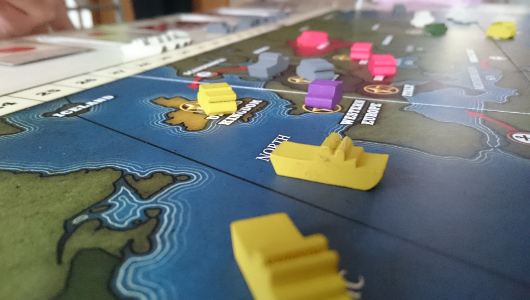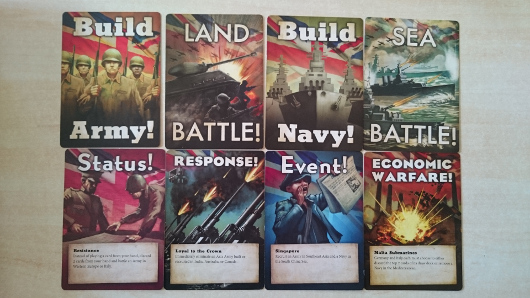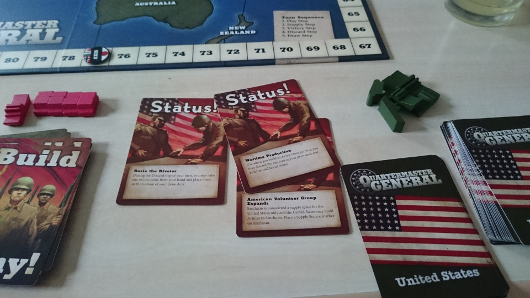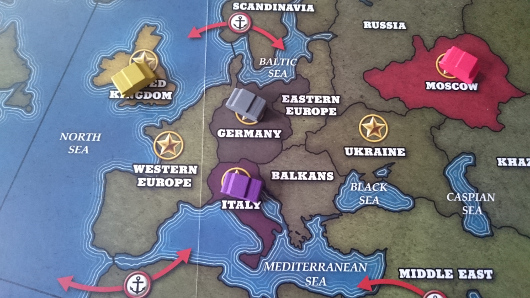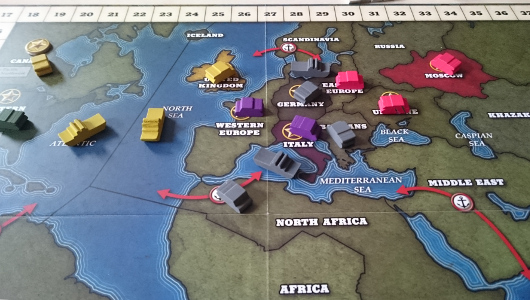Quartermaster General is a really dull name for a war-game, but I wanted it because it sounded like it might be a better version of Risk. Spoiler – unfortunately I don’t think it fills that niche. Quartermaster General is a game about the broad scope of World War II, that lets you, and up to 5 friends, play out the whole war from the perspective of the six major powers: Germany, the United Kingdom, Italy, the Soviet Union, the United States and Japan. Impressively it does this in somewhere between one and two hours, so that’s definitely one up on Risk!
• Designer: Ian Brody
• Publisher: Griggling Games
• Number of Players: 2-6
• Playing Time: 60-120 minutes
For a game that captures the scope of the Second World War Quartermaster General also plays remarkably simply. You play a card from your hand of seven cards, then do what is says on the card. You wrap up your turn with a little upkeep, then done and only the next country. This is where the comparison to Risk becomes somewhat meaningless. Risk is a game about sweeping across continents with your grand armies and rolling handfuls of dice to determine the victor. Quartermaster General on the other hand is slow, contemplative, and cunning. The first time you play your turns feel painfully slow as you only do one thing; add a single armies, battle just one fleet, play a single event. When your opponent then just rebuilds the army you defeated it feels like a pointless cycle that just goes back and forth with no actual progress. Which isn’t great, but I want to come back to this point later.
The problem with choosing actions based on the cards in your hand is that it relies on you knowing the cards in the deck you have in order to make informed strategic choices. Which means you often end up just doing the obvious thing each turn without building any longer term plan.
However once you get to know a country’s deck of cards they feel fantastically smart. Each country has a unique deck that ties into that countries resources, strategies and actions that historically took place. In particular one type of card, the Status cards, change the rules in small ways for the country that played the card tying the sides to their historical counterparts in an obvious way. But even the split of the cards reinforces the theme. For example the Soviet Union has the most Build Army cards that let you add forces to board, representing the endless manpower available, so that when you are fighting against them it feels like you can never make any headway because they always have men to replace the ones you have just defeated. This is fantastic, the various decks makes each side unique in the way it feels to play and the strategies you need to adopt to win.
The other thing that is great about the card play is that you only play through your deck once. Once you have used all your cards, you’re done. This represents each country’s economic resources and capacity to carry on the war. The US has a massive deck of cards that feels like an economic powerhouse that just needs to get up to speed before it dominates the world, whereas Japan and Italy have tiny decks and it feels like you must take a decisive lead at the beginning if you want to have any hope of winning. This ties in beautifully to the upkeep at the end of your turn where you can discard as many cards as you like so that when you draw back up to seven cards again you have a better chance of getting the specific card you need. But then you burn through your cards faster and run the risk of running out of steam before the end of the game, forcing you to decide whether you should you be reckless or if you can afford to play it slow and safe.
Once you get to know the deck the gameplay also changes. What was a slow ponderous and somewhat erratic affaire in the first game becomes a surprisingly rich level of strategy. As I mentioned earlier there is ample opportunity for two players to go back and forth endlessly without achieving anything. This is terrible as a first time player, but when you know what your country can do you can start to plan your way around the deadlock. Each deck has a number of tricks up its sleeves giving you chance to scheme and plot, and ultimately outwit your opponent. If the rules let you play more cards per turn the situation would change too fast for planning to be worthwhile.
Even more importantly, the slow and ponderous nature of each turn forces the teams to play together and coordinate their offensive. One on one battles between countries in Quartermaster General so often turns into a deadlock, so you need a friend to take advantage of the breach in the defences you make, and you end up plotting over two or three turns to break through. I don’t know many other games where coordinating your forces is as important, or as satisfying.
One final point I want to discuss is the issue of balance between the two teams. I’ve not played it enough yet to know for certain, but it feels like the game is weighted towards the allies. It isn’t impossible for the axis to win, but the onus is on their side to get ahead whereas the allies can happily coast to a victory if Germany, Italy and Japan don’t put some pressure on. I think this becomes less of an issue as players become more familiar with the decks, but definitely felt a little unfair during the first couple of games.
Quartermaster General is a game I really want to like, and for the most part think is fantastic. When it works it plays tight and fast, letting you pit your plan and your wits against your opponents. The country decks are a simple and elegant way of adding a lot of theme as well as strategy to the game, and I really enjoyed plotting my way to victory.
But when Quartermaster General doesn’t work it is a frustrating and disempowering experience where your choices feel pointless. It’s possible to get knocked back so far you have no position on the board, or just don’t have any of the cards you need in your hand, all of which can make the game an unpleasant experience. Until you’ve played the game a couple of times with one country to get your head around what that deck can do games of Quartermaster General can easily go like this.
Quartermaster General is a game to check out if you like a smart strategic war-game and are willing to give it a couple of plays to get your head around it. However don’t expect it to be the light easy replacement for Risk.
